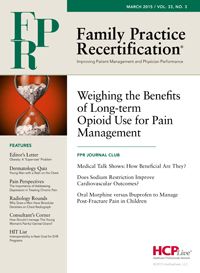Does Sodium Restriction Improve Cardiovascular Outcomes?
Dietary sodium restriction is frequently recommended as a means to manage hypertension, congestive heart failure and cardiovascular disease. However, with the growing focus on patient-centered outcomes rather than disease-centered outcomes, the importance of sodium restriction becomes less clear.
Review
Kalogeropoulos AP, Georgiopoulou VV, Murphy RA, et al. Dietary Sodium Content, Mortality, and Risk for Cardiovascular Events in Older Adults: The Health, Aging, and Body Composition (Health ABC) Study. JAMA Intern Med. Published online January 19, 2015. doi:10.1001/jamainternmed.2014.6278
Dietary sodium restriction is frequently recommended as a means to manage hypertension, congestive heart failure and cardiovascular disease. However, with the growing focus on patient-centered outcomes rather than disease-centered outcomes, the importance of sodium restriction becomes less clear. Cardiovascular disease (CVD) remains the number one cause of death in the United States and hypertension is often used as a surrogate for CVD. Hypertension is the number one reason for office visits for adults in the United States and affects approximately 30% of the US population. Sodium restriction is often recommended as a lifestyle modification to control blood pressure. Other lifestyle changes include exercise and diets that emphasize fresh fruits and vegetables help control blood pressure.
Methods
This study analyzed 10-year follow-up data from 2642 older adults (ages 71-80 years old) participating in a community-based, prospective cohort study (between April 1, 1997 and July 1998). The study assessed patients’ dietary habits using the Food Frequency Questionnaire developed for the Health, Aging and Boding Composition (Health ABC) Study to determine patients’ average sodium intake.
The patients were categorized into low, medium and high sodium intakes which were defined as <1500mg/day, 1500-2300mg/day, or >2300mg/day respectively. Patients were then followed for 10 years via telephone interview every 6 months as well as review of hospital records, death certificates, informant interviews and autopsy data. Outcomes were measured for incident coronary vascular disease, incident heart failure, and mortality. Additional characteristics were measured such as blood pressure, heart rate, appetite, ECG, and laboratory data, but these were not the primary outcomes of the study.
Results & Outcomes
After 10 years, 881 participants (33.7%) had died. There was a linear association between sodium intake and mortality, but when adjusted for other risk factors, the results were not statistically significant (P=.07). There was a trend towards increasing mortality with higher sodium intakes (>2300mg/day) particularly in female and black participants. Additionally, there was no indication of a mortality benefit with sodium intakes less than 1500mg/day compared to 1500-2300mg/day.
The 10 -year incident heart failure and incident cardiovascular disease showed a similar, linear trend but without any statistical significance in the adjusted model. For mortality risk, there was a non-significant trend towards an increased risk, again, mostly in female and black participants.
Conclusion:
In patients aged 71-80, there was no significant association between sodium intake as assessed by food frequency questionnaire and 10 year mortality, incident heart failure, or incident cardiovascular disease.
Commentary
This prospective community-based prospective cohort study found no impact of dietary sodium intake on mortality, heart failure, or cardiovascular disease. Additionally, it suggests strict sodium restrictions (<1500mg/day) provides no benefit in terms of mortality or heart disease. There may be a trend towards increasing rates of adverse events at high intake levels (>2300mg/dl), but no significant difference was noted.
Potential limitations of this study include the prospective cohort study design rather than a randomized control trial. However, a randomized controlled trial on the influence of salt intake on CVD outcomes is highly challenging and unlikely to done. Even if it could be completed, registering a large enough study cohort (approximately 28,000 to detect a 10% reduction in mortality over 5 years) would be almost impossible (He, et al). Other limits of this study include an unequal number of patients in the various study arms. There were a total of 291 participants in the <1500mg/day portion, 779 participants in the 1500-2300 mg/day portion and 1572 patients in the >2300 mg/day portion of the study. This variability limits the internal validity and applicability of this study to general practice.
Strengths of this study are the use of a validated Food Frequency Questionnaire and the well- documented follow up on the patients involved. Although the age of the study population might make it less applicable to patients throughout their adulthood, it does look specifically at those whose age makes them high risk for CVD.
This study suggests a need for further high-quality research on the risks and benefits of sodium restriction to prevent CV outcomes. It found limiting sodium intake below 1500 mg/day was of no benefit (and likely made eating less enjoyable). And, until more data is available, using sodium restriction for secondary prevention of CV disease seems to be without scientific evidence and should NOT be a focus of patient counseling. Rather, aerobic exercise, a diet high in fruits and vegetables, and smoking cessation remains the best approach.
References
Salt reduction lowers cardiovascular risk: meta-analysis of outcome trials
He, Feng J et al. The Lancet , Volume 378 , Issue 9789 , 380 — 382
